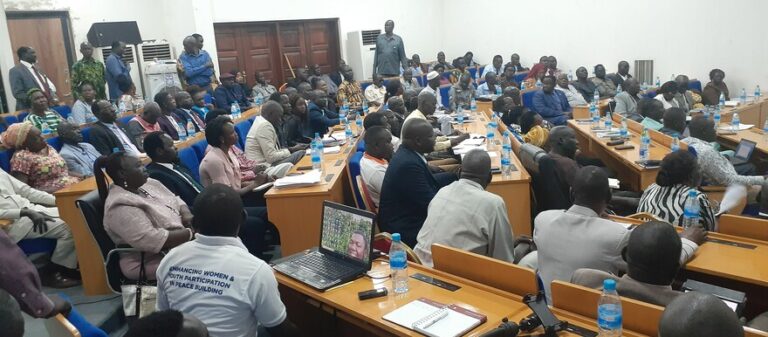The Transitional National Legislative Assembly’s (TNLA) on Wednesday questioned the Finance ministry why civil servants and the organized forces had gone for nearly 11 months without pay despite South Sudan meeting its revenue target in the fiscal year 2023/2024.
A member of the House Finance Committee, Goc Makuach, said during a budget public hearing in parliament, that the government met its target in the concluded fiscal year.
Makuach said revenue projection for 2023/2024 fiscal year was 1.7 trillion SSP, but the government surpassed this by 400 billion SSP, collecting a total of 2.1 trillion SSP.
The lawmaker said the oil revenue estimation was 1.5 trillion SSP, but the government managed to collect 1.8 trillion SSP, despite the export interruptions due to the Sudan and the Middle East crises.
The government estimated that 245 billion SSP non-oil revenue would be generated within the 2023/24 fiscal year. It, however, managed to collect 238 billion SSP.
“In the outturn of FY2023/2024, total revenue projection stands at 1.7 trillion. But the out turn was 2.1 trillion,” Makuach said, adding that all the revenue collection in that fiscal year was 1.5 trillion and out turn of the oil was 1.8 trillion SSP.
Makuac said the government also managed to make payments as estimated in last year’s budget.
He, however, questioned the Finance ministry why civil servants went for over 10 months without pay, if it managed to meet its target?
“The whole payment approved by the government was 2.1 trillion, and the out turn was 2.4 trillion, achievement of 113%. That means the Ministry of Finance achieved the target,” he stressed.
The Executive Director for the Community Empowerment for Progress Organization (CEPO), Edmund Yakani, questioned the fate of the 2023/24 Constituency Development Fund (CDF) allocation.
He said every year the government allocated 3 percent of the total budget to CDF; noting that in the 2023/24 fiscal year, over 47 billion SSP was allocated. However, the money was never released.
Yakani also raised concern over the country’s failure to meet the Abuja Declaration requiring 15% budget allocation to health.
“The last question I want to bring to your attention is why the budget was not adhering to the Abuja Declaration, which says 15 percent is supposed to be spent on health,” he said.
Yakani criticized the lawmakers for not advocating for the CDF to develop the constituencies.
His sentiments were echoed by David Kaunda, a representative of the national NGO Amalna South Sudan.
For his part, Parmena Awerial Aluong, Deputy Speaker for Administration and Finance said the public hearing aims to collect the views of stakeholders on the annual budget.
“So today is good for the public to hear about the budget as it has been stated by the Chairperson of Finance. Sometimes, when the budget hearing is not made, people doubt that the Parliament has worked on the budget,” said Awerial. “So it is better for you to contribute your ideas and to know exactly what the Parliament is doing.”
The lawmaker pointed out that the contribution of civil society and other stakeholders is crucial in enriching and improving the national budget.




